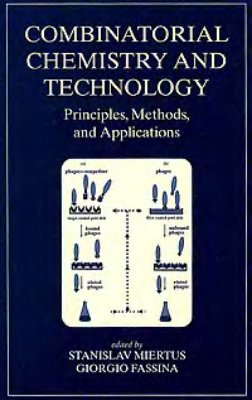USA, Marcel Dekker, Inc. /. , 1999. – 422 p.
Combinatorial methodologies have dramatically changed the drug discovery process in the pharmaceutical industry, offering an unlimited source of new molecular entities to be screened for activity. Innovative chemistries, software, hardware, and advanced molecular biology protocols have been developed in the past few years to generate numerically complex and structurally diverse libraries of compounds, as well as new automated approaches for simultaneous screening. This field not only has integrated, complemented, and revitalized existing research activities, it also has tremendously stimulated the evolution of other disciplines and technologies, such as solid-phase chemistry, molecular modeling, in vitro screening of biological activities, miniaturization, and automation, to satisfy the demand to design, produce in high yield and purity, and rapidly screen huge numbers of molecules.
This book provides comprehensive coverage of the current methodologies employed for the design, synthesis, and screening of molecular libraries. Major topics include generation of molecular libraries by chemical methods using solution and solid-phase chemistries; biological approaches for the production and screening of peptide, antibody, and oligonucleotide libraries; the application of computer-assisted approaches to guide library synthesis; the use of high-throughput screening methodologies to accelerate lead discovery; development of automation and robotics; and economic and legal issues. The book is intended for scientists, technologists, and doctoral fellows who require an introduction to the combinatorial world. All the basic approaches and methodologies are reviewed in sufficient detail to provide university-level teachers with a useful textbook for a course in combinatorial technologies.
Introduction of the ICS-UNIDO Program in Combinatorial Chemistry and Technology
Combinatorial Chemistry and Combinatorial Technologies: Principles and Applications
Synthesis and Characterization of Peptide Libraries
Solid-Phase Synthesis of Organic Libraries
Resins, Linkers, and Reactions for Solid-Phase Synthesis of Organic Libraries
Solution-Phase Combinatorial Libraries of Small Organic Molecules
Direct Deconvolution Techniques for Pool Libraries of Small Organic Molecules
Encoding Techniques for Pool Libraries of Small Organic Molecules
Analytical Characterization of Synthetic Organic Libraries
Automation in Combinatorial Chemistry
Key Ingredients for Efficient High-Throughput Screening
Computational Aspects of Combinatorial Chemistry
Biological Libraries
Peptide Display Libraries: Design and Construction
Making and Selecting from Phage Antibody Libraries
Biopanning
Globular Oligonucleotide Screening via the SELEX Process: Aptamers as High-Affinity, High-Specificity Compounds for Drug Development and Proteomic Diagnostics
Economics of Combinatorial Chemistry and Combinatorial Technologies
Combinatorial methodologies have dramatically changed the drug discovery process in the pharmaceutical industry, offering an unlimited source of new molecular entities to be screened for activity. Innovative chemistries, software, hardware, and advanced molecular biology protocols have been developed in the past few years to generate numerically complex and structurally diverse libraries of compounds, as well as new automated approaches for simultaneous screening. This field not only has integrated, complemented, and revitalized existing research activities, it also has tremendously stimulated the evolution of other disciplines and technologies, such as solid-phase chemistry, molecular modeling, in vitro screening of biological activities, miniaturization, and automation, to satisfy the demand to design, produce in high yield and purity, and rapidly screen huge numbers of molecules.
This book provides comprehensive coverage of the current methodologies employed for the design, synthesis, and screening of molecular libraries. Major topics include generation of molecular libraries by chemical methods using solution and solid-phase chemistries; biological approaches for the production and screening of peptide, antibody, and oligonucleotide libraries; the application of computer-assisted approaches to guide library synthesis; the use of high-throughput screening methodologies to accelerate lead discovery; development of automation and robotics; and economic and legal issues. The book is intended for scientists, technologists, and doctoral fellows who require an introduction to the combinatorial world. All the basic approaches and methodologies are reviewed in sufficient detail to provide university-level teachers with a useful textbook for a course in combinatorial technologies.
Introduction of the ICS-UNIDO Program in Combinatorial Chemistry and Technology
Combinatorial Chemistry and Combinatorial Technologies: Principles and Applications
Synthesis and Characterization of Peptide Libraries
Solid-Phase Synthesis of Organic Libraries
Resins, Linkers, and Reactions for Solid-Phase Synthesis of Organic Libraries
Solution-Phase Combinatorial Libraries of Small Organic Molecules
Direct Deconvolution Techniques for Pool Libraries of Small Organic Molecules
Encoding Techniques for Pool Libraries of Small Organic Molecules
Analytical Characterization of Synthetic Organic Libraries
Automation in Combinatorial Chemistry
Key Ingredients for Efficient High-Throughput Screening
Computational Aspects of Combinatorial Chemistry
Biological Libraries
Peptide Display Libraries: Design and Construction
Making and Selecting from Phage Antibody Libraries
Biopanning
Globular Oligonucleotide Screening via the SELEX Process: Aptamers as High-Affinity, High-Specificity Compounds for Drug Development and Proteomic Diagnostics
Economics of Combinatorial Chemistry and Combinatorial Technologies

